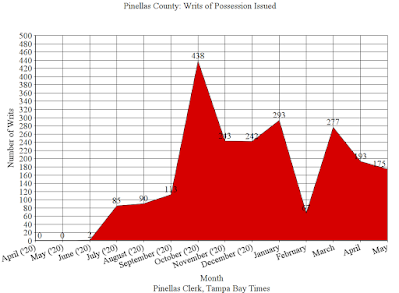As lockdowns were established to contain the spread of COVID-19 during the early days of the pandemic, millions of tenants found themselves unable to pay rent due to job loss and other income disruptions. A number of eviction protections were established across the country by federal, state and local governments.
In Florida, a state moratorium on evictions was established by executive order from Gov. Ron DeSantis and was effective between April 2-September 30, 2020. This was followed by the federal CDC moratorium on evictions, which began on September 4, 2020 and is currently still in effect until June 30, 2021, although a court decision briefly voided it for about a week last month. In addition, a limited moratorium on evictions at properties with federally-backed mortgages was in effect between March 27-July 27,2020 as part of the CARES act. In Hillsborough county, Sheriff Chronister announced his deputies would be suspending the execution of writs of possession there between March 18 and April 20, 2020.
This patchwork of protections caused a lot of confusion over interpretation and enforcement, and began to fall apart as lockdowns were slowly lifted throughout the summer. On July 30, Governor Ron DeSantis narrowed the scope of the state moratorium to only include tenants who were "adversely affected" by COVID-19, and allowed eviction cases to proceed in the courts up until final judgement.
Upon the expiration of the Florida moratorium on September 30th, Florida tenants were able to seek protection under the CDC moratorium on eviction. Unlike the Florida moratorium, in which protections were automatic, the CDC moratorium requires tenants to sign a sworn declaration that must be submitted to the landlord in order to receive protection. As was the case with the Florida moratorium, the CDC moratorium only applies to tenants who were adversely affected by COVID-19, and does not cover cases other than non-payment or protection from lease non-renewal.
In Pinellas county, landlords and their lawyers quickly moved to take advantage of the narrowed protections.
A subsequent spike in writs of possession ensued here in Pinellas county, with a whopping 438 writs issued in the month of October. A writ of possession, or final eviction order, directs the Sheriff to deliver possession of a property back to the owner. Deputies will post a notice like the one pictured below, which gives tenants 24 hours to vacate, and tenants who refuse to comply will be removed by force. Initial eviction filings would also reach their highest levels throughout the duration of the pandemic so far, with over 100 evictions filed on average per week between October 2020-Febuary 2021.
Since April of last year, there have been 2,218 writs of possession issued in Pinellas county, along with a total of 4,353 eviction filings, according to data collected from the Pinellas Clerk of Court. There still around 2,000 open eviction cases here in Pinellas county dating back to January 2020.
It should be noted that some of the most aggressive eviction filers during the pandemic have been so-called corporate landlords, or career landlords, who manage numerous properties as their primary source of revenue. In Pinellas county, over half of the 4,353 eviction filings during the pandemic have come from companies, not individuals. Some of the top filers here include Dominium, BH Management and Radco, just to name a few.
So why did our system fail to protect the people who needed help the most?
This is because our system is made to elevate property rights for some over human rights for all. Instead of enacting strong, effective protections for vulnerable tenants, our political leaders attempted to strike a "balance" between the health of the multi-billion rental industry and the health of you and your family, which resulted in deadly consequences. A recent study showed that evictions lead to an additional 10,000 deaths from COVID across the country.
As working people, our lives are completely expendable in a capitalist system. There is nothing fair or free about a system which withholds basic necessities from some people in order to make other people extremely rich. The freedom of the ruling class, the CEOs and corporate landlords is based on our hard work, on our hard earned cash.
We must demand more.
We deserve better.
And if they don't deliver then it is our duty to fight to take our power back. ✊🔥






No comments:
Post a Comment